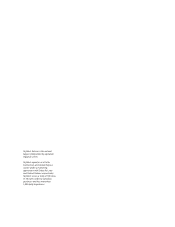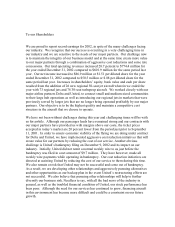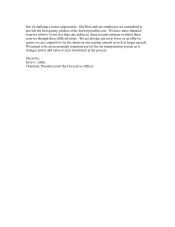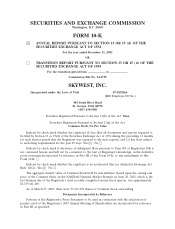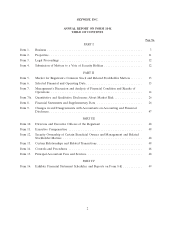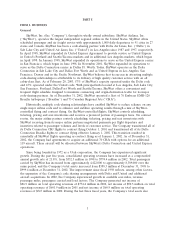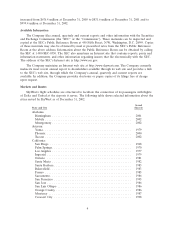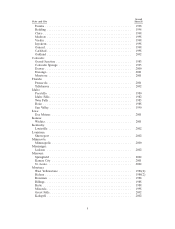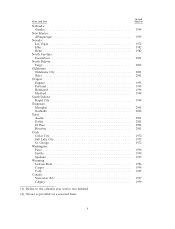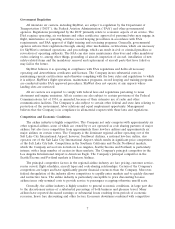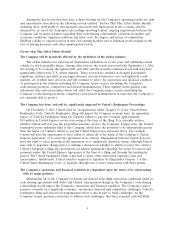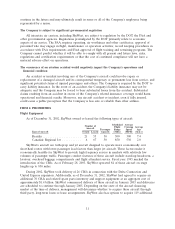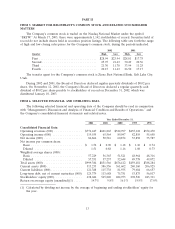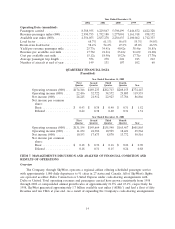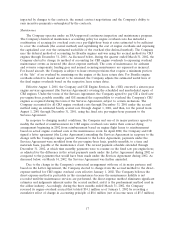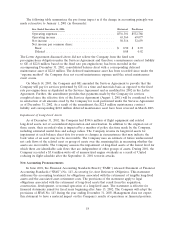SkyWest Airlines 2002 Annual Report Download - page 12
Download and view the complete annual report
Please find page 12 of the 2002 SkyWest Airlines annual report below. You can navigate through the pages in the report by either clicking on the pages listed below, or by using the keyword search tool below to find specific information within the annual report.pressures have contributed to a number of bankruptcies among major carriers. On December 9, 2002,
United filed a petition for reorganization under Chapter 11 of the United States Bankruptcy Code.
One consequence of United’s bankruptcy filing was United’s failure to pay to the Company
approximately $14 million in United Express service fees owing at the time of United’s filing. It is the
Company’s understanding that United has received approval from the U.S. Bankruptcy Court
authorizing, but not requiring, United to honor pre-petition obligations to its United Express carriers.
Notwithstanding the Bankruptcy Court’s authorization of United’s payment of the Company’s
pre-petition claim, the Company has not received such payment, nor has it received any indication or
assurance that United intends to pay the Company’s claim. In addition, if the Company’s major
code-sharing partners experience longer-term declines in passenger loads or are adversely impacted by
low ticket prices, high fuel prices or other factors, they will likely seek to reduce the Company’s fixed
contract fees, adjust other terms of the Company’s code-sharing relationships or cancel Company
code-sharing flights in order to reduce their costs.
Employees
As of December 31, 2002, the Company employed 5,079 full-time equivalent employees consisting
of 1,930 pilots and flight attendants, 2,341 customer service personnel, 608 mechanics and other
maintenance personnel, and 200 administration and support personnel. The Company’s employees are
not currently represented by any union. The Company is aware, however, that collective bargaining
group organization efforts among its employees occur from time to time and management anticipates
that such efforts will continue in the future. During August 1999, the question of whether or not to join
the Airline Pilots Association (‘‘ALPA’’) was submitted to the Company’s pilots, who voted against
joining ALPA by a narrow margin. Under governing rules, the Company’s pilots may again vote on this
issue at any time because one year has passed since the previous vote. If unionization efforts are
successful, the Company may by subjected to risks of work interruption or stoppage and/or incur
additional expenses associated with union representation of its employees. In connection with the
Company’s proposed acquisition of additional CRJs and related expansion, the Company anticipates
hiring approximately 2,000 additional employees, many of whom may be represented by a union in their
current employment. The Company has never experienced any work stoppages and considers its
relationships with its employees to be good.
Seasonality
As is common in the airline industry, SkyWest’s operations are favorably affected by increased
travel, historically occurring in the summer months, and are unfavorably affected by decreased business
travel during the months from November through January and by inclement weather which occasionally
results in cancelled flights, principally during the winter months.
Forward-Looking Statements
The Company may, from time-to-time, make written or oral forward-looking statements. Forward-
looking statements may appear in documents filed with the Commission, in press releases, and in
reports to shareholders. The Private Securities Litigation Reform Act of 1995 contains a safe harbor for
forward-looking statements. The Company relies on this safe harbor in making such disclosures. When
used in this document, the words ‘‘anticipate,’’ ‘‘estimate,’’ ‘‘believe,’’ ‘‘project,’’ ‘‘expect,’’ and similar
expressions are intended to identify forward-looking statements. Although management believes that
the expectations reflected in such forward-looking statements are reasonable, the Company can give no
assurance that such expectations will prove to have been correct. Such statements are subject to certain
risks, uncertainties and assumptions. Should one or more of these risks or uncertainties materialize, or
should underlying assumptions prove incorrect, actual results may vary materially from those
anticipated, estimated, projected or expected.
8


